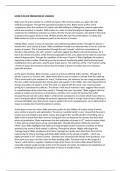Lecture notes
Example grade 9 essay- London, William Blake
This is a Grade 9 GCSE essay on place in London, by William Blake. There is in depth AO2 analysis, along with relevant AO3 context. The essay can be modified to fit other questions. Especially relevant to AQA Power and Conflict anthology, along with the WJEC anthology
[Show more]



